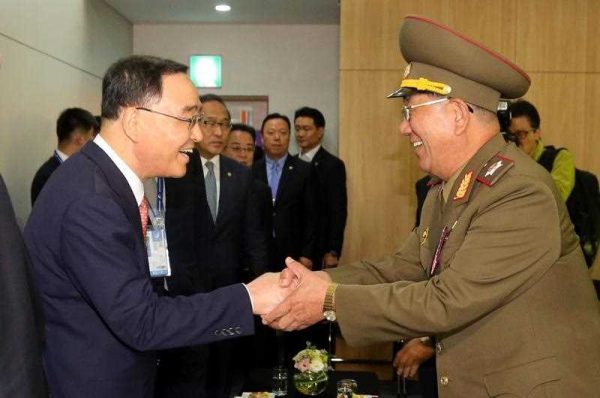She established a ‘unification preparation committee’. But North Korea criticised the Dresden Declaration as Seoul’s attempt to absorb the Pyongyang regime. There were some attempts to restart high-level talks, though little progress was made as both sides showed little willingness to make concessions. Seoul has refused to remove sanctions against the North, known as the 5-24 measures, under which all economic exchanges between North and South Korea are suspended.
North Korea has refused to make any prior commitment to denuclearisation — demanded by the US — before returning to the Six Party Talks. While the international community has increased pressure on the Kim Jong-un regime with the UN General Assembly’s resolution on human rights, Pyongyang has responded by threatening the US and South Korea with retaliation. With both sides making renewed proposals for high-level talks, including the possibility of a Park–Kim summit, however, 2015 could be an important time for President Park to make breakthroughs in the trust-building process with North Korea.
The tragic sinking of the Sewol ferry that claimed 304 lives on 16 April 2014 led to national soul-searching. South Koreans were disturbed by the confusion and lack of leadership and coordination in the government and the lax enforcement of safety regulations due to collusion between the regulators and the maritime industry. Families of victims demanded thorough investigation of the causes of the accident and the rescue failure. But it took months of protests before legislation for the establishment of the special investigation committee and appointment of special prosecutors finally passed the National Assembly.
A series of defamation suits against journalists and critics of the Park government reflect a continuing trend of declining freedom of expression in South Korea. When a Japanese daily, Sankei Shimbun, reported rumours about President Park’s whereabouts during the critical hours on 16 April, prosecutors investigated and indicted a Sankei reporter for defamation. Later, when the local daily Segye Ilbo broke a story about Park’s former aide Chung Yoon-hoi’s secret meddling in state affairs and the power struggle between him and Park’s younger brother Park Ji-man, the presidential secretariat filed a libel suit against six people at the newspaper. Freedom House has continued to rate the country’s freedom of the press and internet freedom as ‘partly free’ since the organisation first downgraded South Korea’s freedom of the press status from ‘free’ to ‘partly free’ in 2010. In addition, the Park administration’s inadequate response to the National Intelligence Service’s illegal involvement in the 2012 presidential election campaigns led Freedom House to downgrade the country’s political rights score from one to two (on a scale of one to seven, with one being the highest), while South Korea’s civil liberties score has remained at two.
Although President Park’s approval rating declined over the government’s mishandling of the Sewol incident and a series of political scandals, the opposition failed to improve its standing. Ahn Chul-soo, who once claimed to symbolise ‘new politics’, became co-chair of the main opposition New Politics Alliance for Democracy — giving up his earlier plan to form a new party. But he failed to provide any substance for his ‘new politics’ and had to resign as co-chair after the party’s defeats in nationwide local elections in June and special legislative elections in July. It is yet to be seen whether the opposition’s new leader, which will be selected in its national convention scheduled in early February 2015, will be able to revitalise the party.
The Constitutional Court decided on 19 December to disband the leftist United Progressive Party (UPP) and strip the parliamentary seats of its five lawmakers. Critics argued that rather than disband the political party, the Court should have left its fate to the electorate. The UPP obtained twelve seats in the National Assembly elections in 2012 but widespread public perceptions of the party’s pro-North tendency and its internal divide has already weakened its popular support. The party performed so poorly in recent elections that it no longer posed any significant threats to the political system.
There has also been increasing consensus among the lawmakers in both the ruling and opposition parties about the need to amend the Constitution to change the institutional nature of the ‘imperial presidency’ (the single five-year-term presidency). Specific proposals vary from a presidency of two four-year-terms to a pure parliamentary system to a French-style mixed presidential–parliamentary system. While the discussion about Constitutional revision has been virtually suspended by the president, it will likely resurface and may gain momentum in 2015.
Jong-Sung You is a senior lecturer at the Department of Political and Social Change, The Australian National University.


South Korean politics is so depressing. There’s such a lack of character and leadership across the spectrum . The conservatives are just with it enough to put together a business plan and get voted in to power but as soon as anything bad happens nobody knows what’s going on or what to do. Or they’re the ones at fault and it’s clear that these people are not qualified to be running a country.